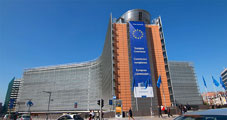
European Commission Urges Georgian Government to Reverse Course Amid EU Concerns
By Liza Mchedlidze
Tuesday, May 6, 2025
The European Commission has called on Georgia's government to change its course, end violence against citizens, repeal repressive laws, and engage in dialogue with political actors. The call follows European Commissioner for Enlargement Marta Kos' comments on the possibility of future dialogue with the ruling Georgian Dream (GD) party, pending significant changes.
Speaking to RFE/RL on April 28, Kos warned the EU is considering measures in response to Georgia's democratic backsliding. These could include suspending visa liberalization, freezing Georgia's EU candidate status, and reassessing the EU-Georgia Deep and Comprehensive Free Trade Area (DCFTA).
The Commission expressed concern that Georgia's current trajectory risks halting its EU accession process. "Political contacts with Georgian authorities have been downgraded and are now limited to efforts to find a way out of the current situation," a Commission spokesperson said.
In response to the government's actions, the EU confirmed the suspension of over EUR 120 million in direct assistance to Georgia. An additional EUR 30 million planned for 2024 is also on hold, and no further assistance is expected for 2025. However, the EU has increased its support for civil society and independent media in Georgia, tripling funding from EUR 5 million to EUR 15 million.
The Commission reaffirmed its readiness to hold accountable those responsible for political violence, emphasizing that "further actions" could be taken if necessary. It called for the Georgian authorities to "re-establish trust" through confidence-building measures, including ending violence, releasing unjustly detained individuals, and suspending repressive laws in consultation with the Venice Commission.
The EU also urged Georgia to engage in meaningful dialogue with all political actors and civil society to resolve the ongoing crisis and reaffirm its commitment to the EU path.

